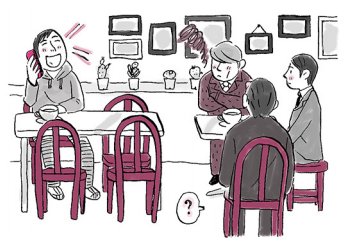Customers Who Can't Read Between The Lines 空気の読めないお客
an - at - but - for - in - over - the - to - up - with
(1_________) Japan, a culture of “reading the situation” exits.
日本には「空気を読む」という文化が あります。
This refers (2_________) interpersonal communication: deciding how to act based on the particulars of place and circumstance.
それは、人との交わりの中で、その場の状況に応じてどのように行動するかを判断することです。
The other day I entered a coffee shop (3_________) a member of my staff and an American client.
先日、私はスタッフと取引先のアメリカ人とで喫茶店に入りました。
Unfortunately there was no space available (4_________) three people to sit together.
あいにく3人が一緒に座れる席は空いていませんでした。
When I looked around a young man using a smartphone was (5_________) a booth that sat four.
見渡すと若い男性が4人席に1人で座り、スマートフォンをいじっていました。
Next (6_________) him was an empty booth that sat two, so if he moved there, we would be able to speak comfortably.
そのとなりの2人席は空席で、彼がそこへ移動してくれれば私たちは快適に話せます。
The young man looked, noticed us, (7_________) feigned indifference.
若者は我々に気づいているようでしたが、知らん顔です。
Angry that the young man couldn't read the situation, I said (8_________) the waitress, “Could you ask him to switch seats?”
私は空気の読めない若者に腹立ち、ウエートレスに「彼に席を移動してもらえないか、話してくれない?」と言いました。
Then she said, “I can not say such things,” and left to fetch (9_________) extra seat.
すると彼女は、「そんなこと言えません」と言って立ち去ると、補助椅子を持って戻ってきました。
Irritated at the young man and the waitress for not picking (10_________) on my signals, I said to him, “Excuse me. Would you mind moving (11_________) to the next seat?”
気持ちをくみ取れない若者とウエートレスにいらだち、私は若者に「すみませんが、隣の席に移動して いただけませんか」と言いました。
He looked (12_________) me blankly and did not move.
彼はきょとんとして私を見ましたが、動きません。
I muttered, “This young man lacks consideration (13_________) others,” but my staff pacified me, saying in a quiet voice, “Now now please calm down.”
私が「気づかいに欠ける若者だな」とつぶやく と、スタッフは「まあまあ、抑えてください」と小声でなだめました。
We ended (14_________) sitting down at the booth that sat two with extra seating attached.
仕方なく私たちは2人席と補助椅子に座りました。
It seemed that (15_________) American client did not understand why I was irritated.
一緒にいたアメリカ人は、私がなぜイライラしているのかわかっていないようです。
Sometime after we began talking, the smartphone of the young man next (16_________) us rang.
私たちが話を始めてしばらくすると、隣の若者のスマートフォンが鳴りました。
Then he began to have an enjoyable conversation (17_________) a language I had never heard.
すると、彼は私が聞いたことのない言葉で楽しそうに話し始めたのです。
I realized that though (18_________) young man had appeared to be Japanese, he was a foreigner.
私 は、日本人に見えた若者が外国人だったことに気づきました。
And, realizing that I had misread (19_________) situation, I became even more irritated.
そして、私は空気を読みちがえたことに気づき、さらにいらだちました。
日本には「空気を読む」という文化が あります。
This refers (2_________) interpersonal communication: deciding how to act based on the particulars of place and circumstance.
それは、人との交わりの中で、その場の状況に応じてどのように行動するかを判断することです。
The other day I entered a coffee shop (3_________) a member of my staff and an American client.
先日、私はスタッフと取引先のアメリカ人とで喫茶店に入りました。
Unfortunately there was no space available (4_________) three people to sit together.
あいにく3人が一緒に座れる席は空いていませんでした。
When I looked around a young man using a smartphone was (5_________) a booth that sat four.
見渡すと若い男性が4人席に1人で座り、スマートフォンをいじっていました。
Next (6_________) him was an empty booth that sat two, so if he moved there, we would be able to speak comfortably.
そのとなりの2人席は空席で、彼がそこへ移動してくれれば私たちは快適に話せます。
The young man looked, noticed us, (7_________) feigned indifference.
若者は我々に気づいているようでしたが、知らん顔です。
Angry that the young man couldn't read the situation, I said (8_________) the waitress, “Could you ask him to switch seats?”
私は空気の読めない若者に腹立ち、ウエートレスに「彼に席を移動してもらえないか、話してくれない?」と言いました。
Then she said, “I can not say such things,” and left to fetch (9_________) extra seat.
すると彼女は、「そんなこと言えません」と言って立ち去ると、補助椅子を持って戻ってきました。
Irritated at the young man and the waitress for not picking (10_________) on my signals, I said to him, “Excuse me. Would you mind moving (11_________) to the next seat?”
気持ちをくみ取れない若者とウエートレスにいらだち、私は若者に「すみませんが、隣の席に移動して いただけませんか」と言いました。
He looked (12_________) me blankly and did not move.
彼はきょとんとして私を見ましたが、動きません。
I muttered, “This young man lacks consideration (13_________) others,” but my staff pacified me, saying in a quiet voice, “Now now please calm down.”
私が「気づかいに欠ける若者だな」とつぶやく と、スタッフは「まあまあ、抑えてください」と小声でなだめました。
We ended (14_________) sitting down at the booth that sat two with extra seating attached.
仕方なく私たちは2人席と補助椅子に座りました。
It seemed that (15_________) American client did not understand why I was irritated.
一緒にいたアメリカ人は、私がなぜイライラしているのかわかっていないようです。
Sometime after we began talking, the smartphone of the young man next (16_________) us rang.
私たちが話を始めてしばらくすると、隣の若者のスマートフォンが鳴りました。
Then he began to have an enjoyable conversation (17_________) a language I had never heard.
すると、彼は私が聞いたことのない言葉で楽しそうに話し始めたのです。
I realized that though (18_________) young man had appeared to be Japanese, he was a foreigner.
私 は、日本人に見えた若者が外国人だったことに気づきました。
And, realizing that I had misread (19_________) situation, I became even more irritated.
そして、私は空気を読みちがえたことに気づき、さらにいらだちました。


 RSS Feed
RSS Feed